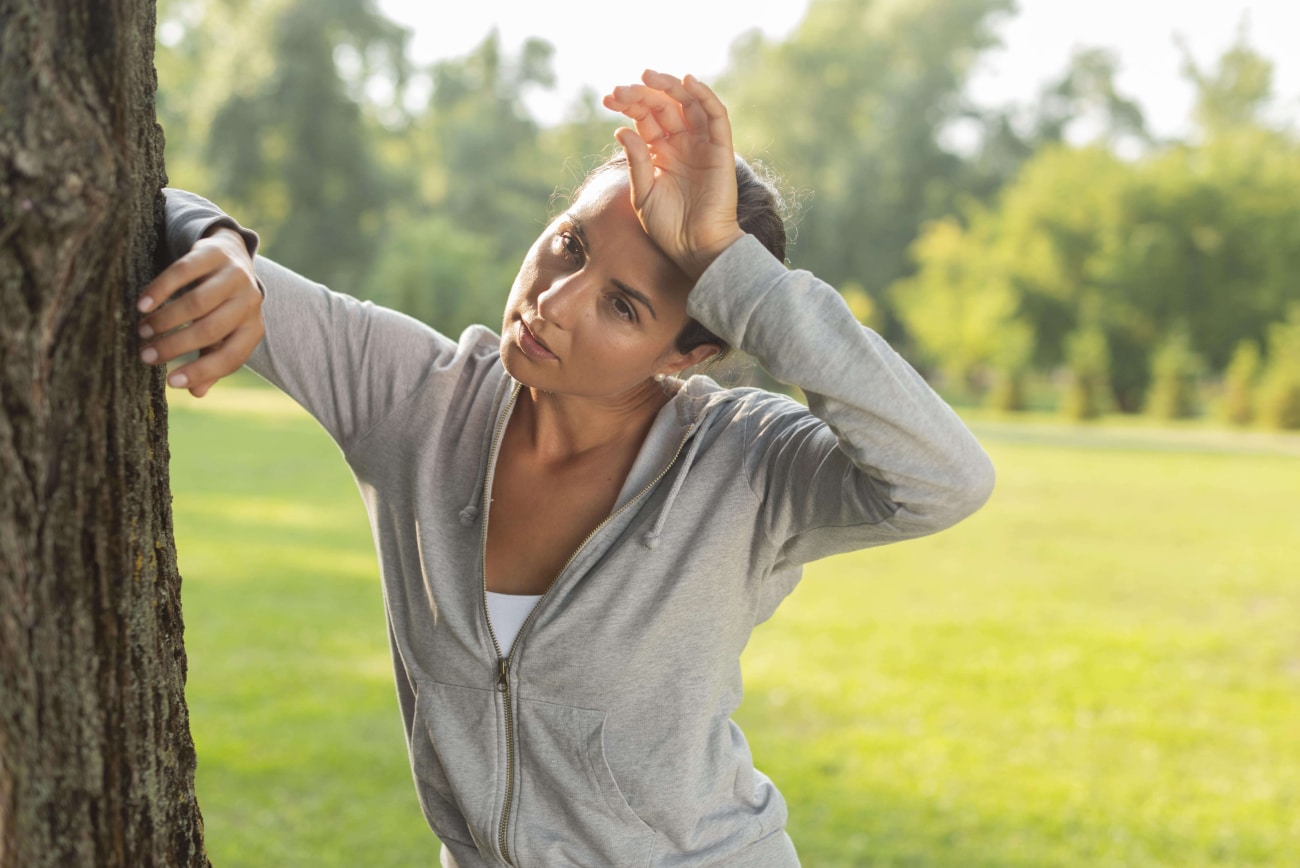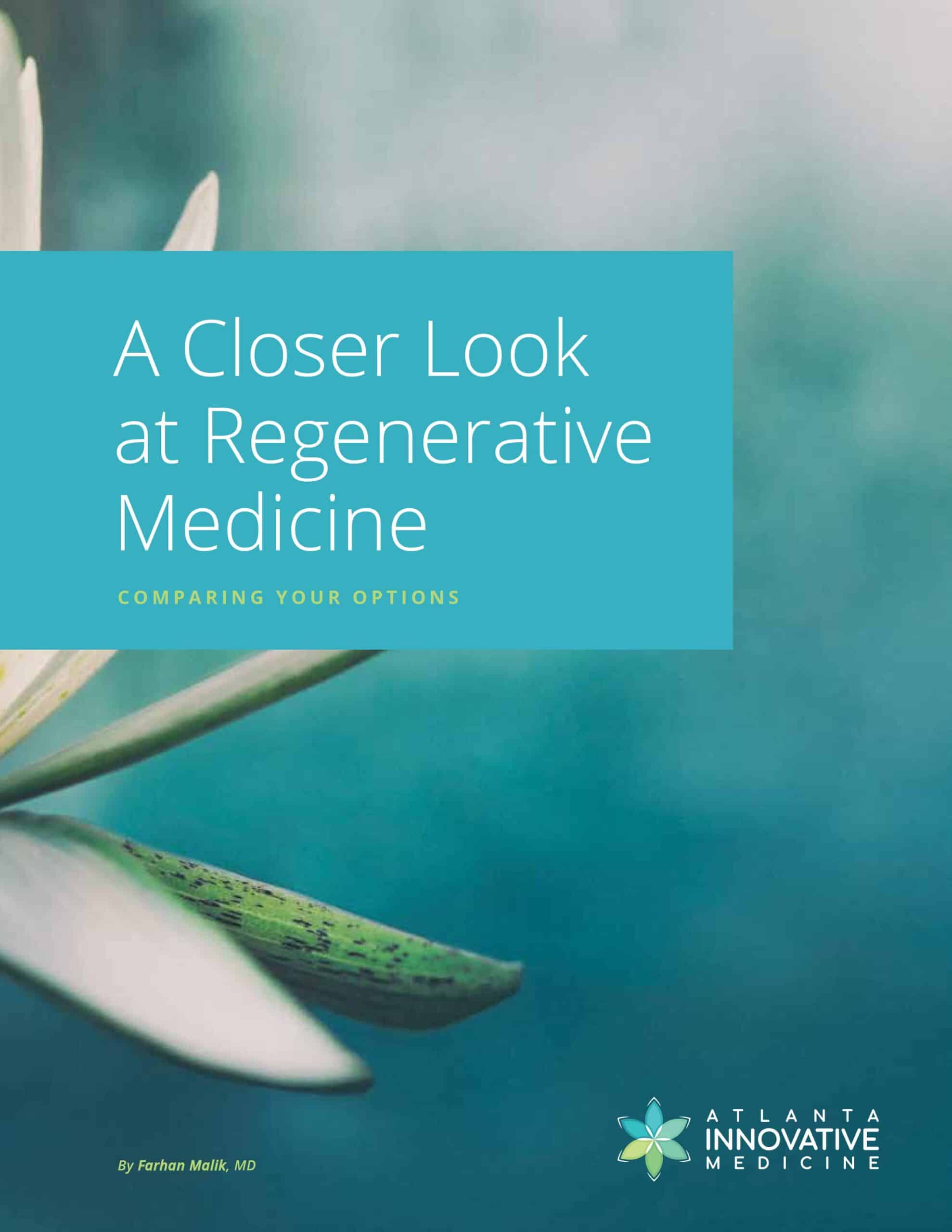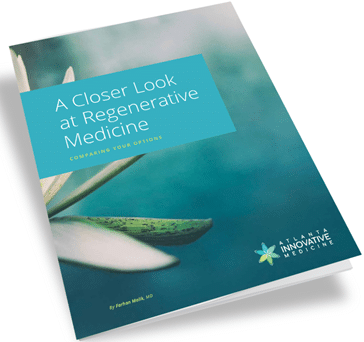By Farhan Malik, MD
Atlanta Innovative Medicine
Fall may be just around the corner, but temperatures remain high, and that persistent heat can take a toll on our bodies—often leading to headaches. You might wonder, can heat cause headaches? The answer is yes. Understanding how heat triggers headaches and knowing how to prevent them is essential for staying comfortable and safe during hot days.
In this article, we’ll explore the connection between heat exposure and headaches, including causes like dehydration, sun exposure, and temperature fluctuations. We’ll share prevention tips and advice on when to seek medical help.
Don’t let headaches control your life. Schedule a free consultation with our experts and start your journey toward lasting relief.
Why Heat Triggers Headaches
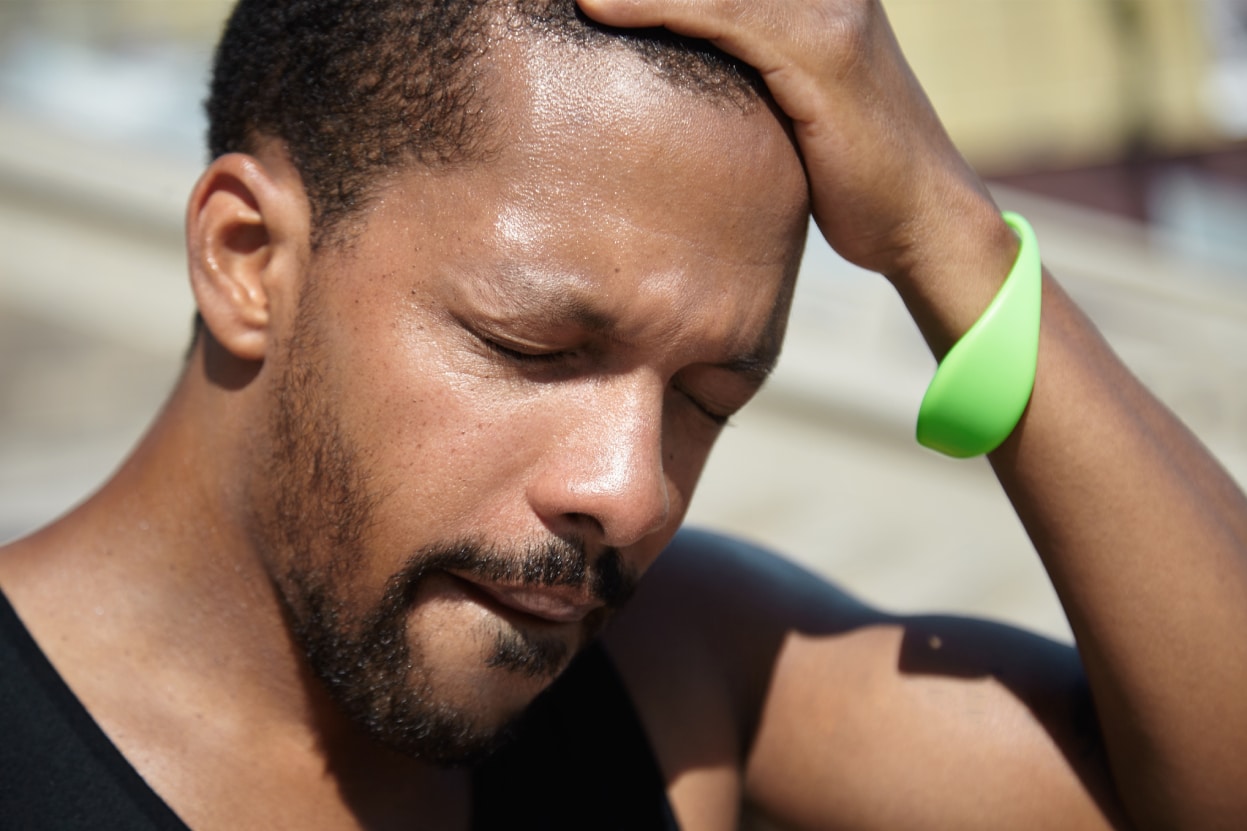
Common Causes of Heat-Induced Headaches
- Dehydration: When you sweat in the heat, your body loses fluids and electrolytes, which can lead to dehydration and trigger headaches.
- Sun Exposure: Bright sunlight can cause eye strain and trigger headaches, especially if you squint or strain to see.
- Overheating: Intense physical activity or being in hot environments can increase your core body temperature. Overheating strains your body’s cooling mechanisms, such as sweating and blood flow, which can lead to headaches and fatigue.
Signs You Have a Heat-Related Headache
Look for symptoms such as throbbing pain, dizziness, nausea, and blurred vision, often accompanied by symptoms like heavy sweating, weakness, and a rapid heartbeat. If these accompany your headache, act quickly—get out of the heat and cool down.
For severe heat exhaustion or heat stroke—marked by confusion, loss of consciousness, or a high body temperature—call emergency services immediately, as heat stroke is a medical emergency needing urgent care.
Recognizing these signs can help you distinguish a heat-related headache from other types, allowing you to act quickly and stay safe.
How to Prevent Heat-Related Headaches
With a few simple tricks, you can keep heat-related headaches at bay. Here’s how you can beat the heat and stay healthy and happy for as long as the summery heat sticks around:
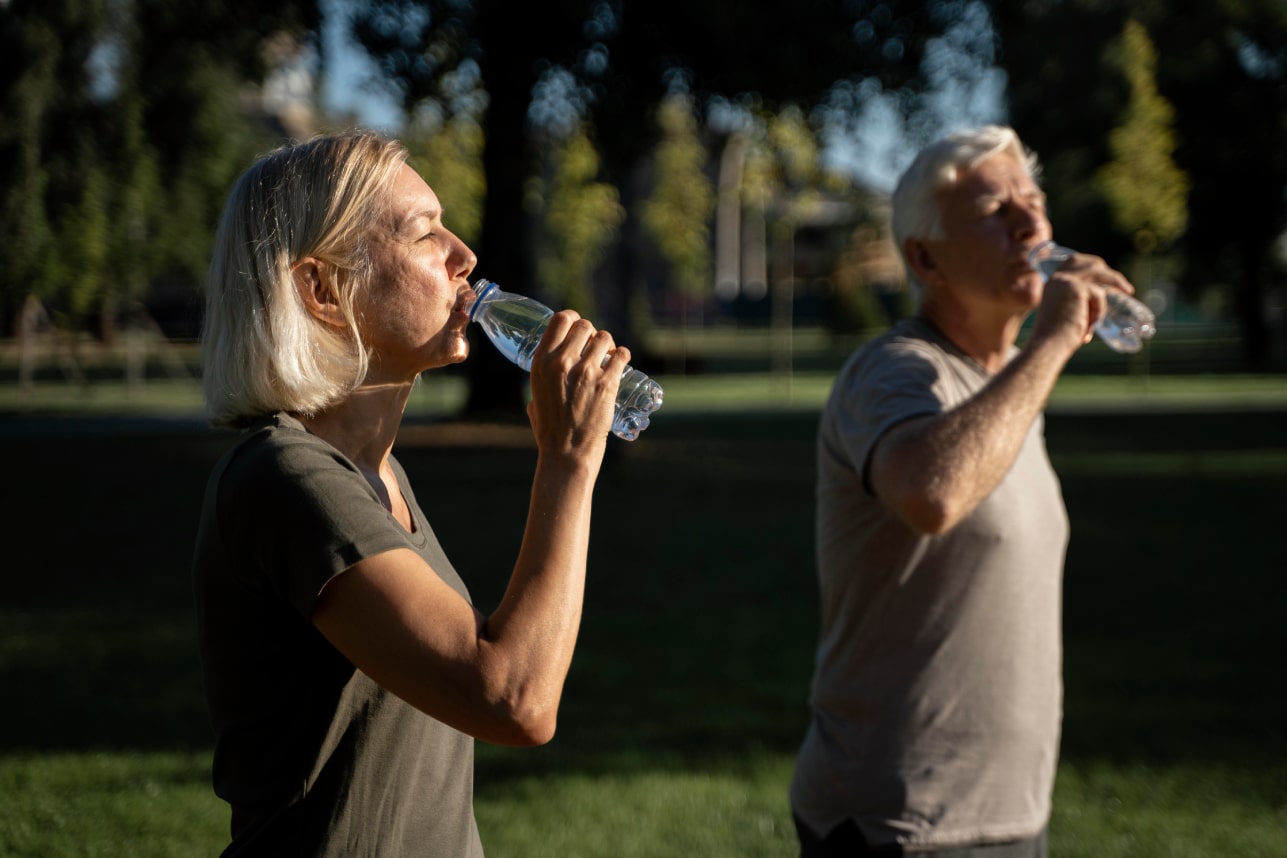
- Seek Cool Environments: Whenever possible, stay in shaded or air-conditioned places during peak heat hours. Keeping your body cool can make a big difference in preventing heat exhaustion and reducing headache triggers.
- Dress Lightly and Protect Your Skin: Choose lightweight, breathable clothing that wicks away sweat, allows your skin to breathe, and blocks UV rays. This helps keep your body temperature down and reduces the risk of overheating.
- Adjust Your Activity Levels and Timing: Avoid vigorous exercise or strenuous activities during the hottest parts of the day. If you need to be active outdoors, do it early in the morning or later in the evening when the temperature is cooler.
- Protect Your Eyes: Wear a wide-brimmed hat and sunglasses to shield your face and eyes from harsh sunlight. This reduces eye strain and helps prevent headaches triggered by squinting or sun glare.
- Stay Hydrated: Drinking plenty of water is your best defense against heat headaches. If you’re sweating heavily, you’ll also need to replenish electrolytes with drinks like sports beverages or electrolyte tablets to keep your body balanced and your head pain-free.
Why Water Isn’t Always Enough for Hydration in High Temperatures
When it’s hot outside or you’re pushing yourself during activity, water alone may not be enough. Your body loses not just water but also vital electrolytes—minerals like sodium, potassium, magnesium, and chloride—that are essential for maintaining fluid balance, muscle function, and nerve activity. When your electrolytes are depleted, as can happen from excessive sweating, drinking water alone can dilute this natural balance, leading to fatigue, muscle cramps, and dizziness.
Natural Sources of Electrolytes:
- Coconut water (rich in potassium & magnesium)
- Leafy greens like spinach and kale
- Fruits such as bananas, oranges, and coconuts
- Seaweed and salty snacks
Hydration Tips:
- Combine water intake with electrolytes (either from natural sources or as sports drinks or tablets) and incorporate hydrating fruits and vegetables like watermelon, strawberries, cucumbers, spinach, and tomatoes into your diet to achieve an optimal balance of hydration.
- Listen to your body—thirst, muscle cramps, and fatigue are signs you need more electrolytes.

Practicing these simple tips and remembering that staying hydrated isn’t just about drinking water—it’s about maintaining the proper mineral balance to keep your body at its best—can help you stay comfortable and protect yourself from heat-triggered headaches. Pay attention to how you feel in the heat and adjust as needed. Your body, especially your head, will thank you!
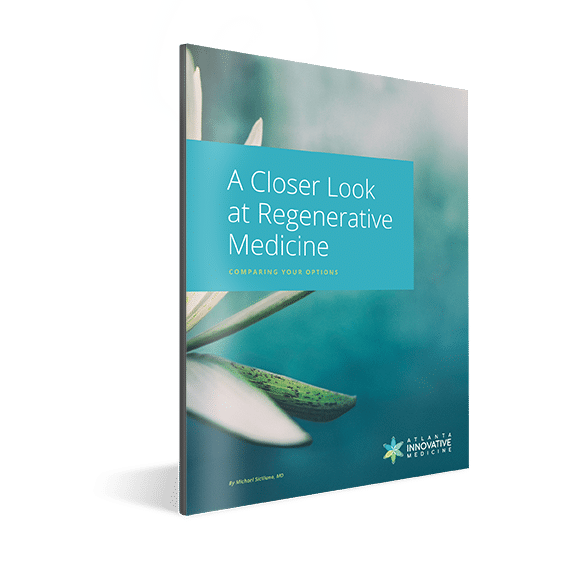
Subscribe for Expert Insights and Our Ebook
A Closer Look at Regenerative Medicine: Comparing Your Options Learn about treatment options like Platelet Rich Plasma (PRP), Prolozone Therapy, and Stem Cell Therapy.
When to Seek Medical Help
If your headache persists despite efforts to cool down and hydrate, or if you experience symptoms such as confusion, dizziness, muscle weakness, or a rapid heartbeat, it’s essential to seek prompt medical attention. Heat-related illnesses can escalate quickly and require professional medical attention.
Quick Tips for Staying Cool: Dress lightly, hydrate frequently, and avoid strenuous activities during peak heat. Use fans or AC, take breaks in cool spots, and apply cool compresses. A few smart steps can keep heat-related headaches at bay!
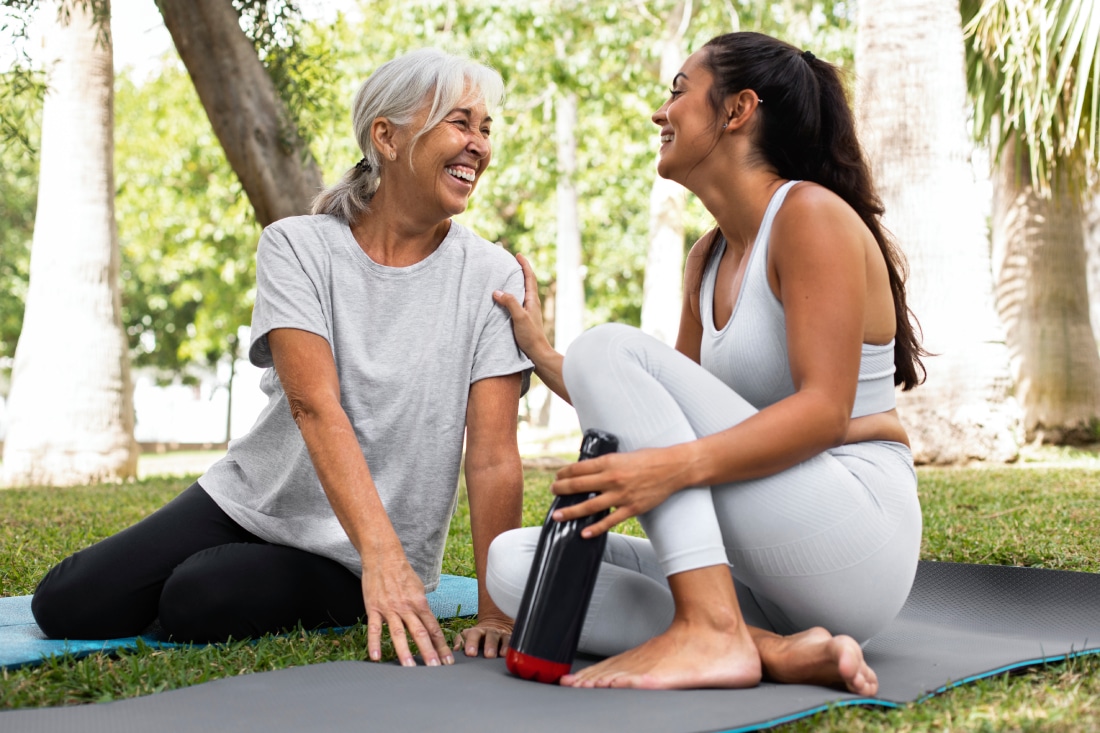
Treating Headaches at AIM
So, can heat cause headaches? Yes, it can. However, persistent headaches—especially when accompanied by neck pain—may indicate underlying issues that require targeted treatment.
At Atlanta Innovative Medicine, our headache specialists conduct comprehensive physical assessments to identify the true cause of your head and neck pain. We then develop a personalized, non-invasive treatment plan that may include regenerative medicine, physical therapy and chiropractic care all designed to heal damaged ligaments and joints.
If you’re experiencing frequent or severe headaches, particularly with neck discomfort, don’t wait to get help. Schedule a consultation with our experts today and let us help you uncover the root cause and find lasting relief.
Quizzes
Are you a candidate for Regenerative Medicine?
Regenerative medicine can be an effective therapy and treatment option for lasting pain relief for a variety of conditions like osteoarthritis of the knee, hip or shoulder; ACL or meniscus tears; tennis or golfer’s elbow; chronic neck and back pain; and more.
Is it right for you and your condition? Take 1 minute to answer a few “yes or no” questions that help to assess if you might be a candidate for PRP, stem cell or other nonsurgical regenerative treatments.
Are You a Stem Cell Candidate for Your Joint or Spine Damage?
Are you a candidate for Platelet Rich Plasma (PRP) Therapy?
Do I have nonsurgical options for my injured or aging joints?
Take the Pain Medications Risk Quiz

Regenerative Medicine.
Reimagined
- Advanced hybrid therapies, including Mesenchymal Stem Cell therapy combined with different mechanisms of action that synergistically come together to support ultimate healing
- More powerful PRP that’s customized, amplified and personalized
- Therapies delivered by an experienced, compassionate team comprised of multidisciplinary experts in traditional and alternative medicine working as your team: Medical Doctors, Nurse Practitioners, Physiotherapists and Chiropractors
- Advanced training through the American Academy of Orthopedic Medicine, the American Osteopathic Association of Prolotherapy Regenerative Medicine, and more
All content of this page is for informational purposes only and is not intended to serve as a substitute for the consultation, diagnosis, and/or medical treatment of a qualified physician or healthcare provider. Individual results may vary. Your medical professional can explain all the risks and potential benefits of any therapy based on your specific circumstances. At this time regenerative therapies are not FDA approved. Neither Atlanta Innovative Medicine nor its physician affiliates promise regenerative therapies as a cure for any condition, disease, or injury.
Other Atlanta Areas We Service:
© 2024 Atlanta Innovative Medicine, LLC. All Rights Reserved. AIM Scholarship Opportunity

